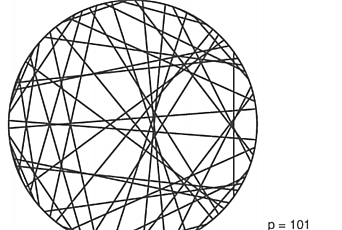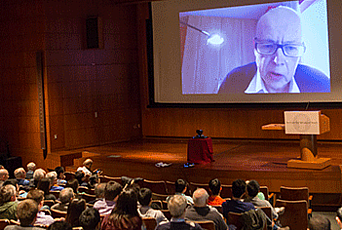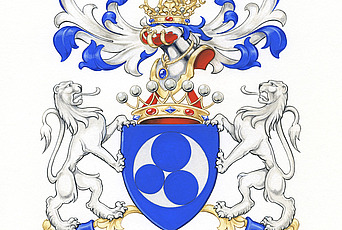Jean Bourgain, Pioneering Mathematician, Dies at 64
Press Contact

Jean Bourgain, IBM von Neumann Professor in the School of Mathematics at the Institute for Advanced Study, revered for the exceptional range, depth, and power of his mathematical work, passed away in Bonheiden, Belgium, on December 22 at the age of 64. Despite a long battle with cancer, his resilient and dauntless approach to challenges remained undeterred. He continued working through the end of his life, with great generosity and grace, while building upon a prolific career in mathematics.
“One of the most fearless and important mathematicians of our time, Jean had an extraordinary ability to bring a new perspective to longstanding questions in numerous areas of mathematics, including number theory, probability theory, and statistical physics, which have been permanently shaped by his contributions,” said Robbert Dijkgraaf, Director and Leon Levy Professor. “Greatly admired for his daring originality and intellectual power, Jean will continue to inspire future generations with his generosity and brilliance. He will be deeply missed at the Institute and by colleagues and friends around the world.”
Bourgain joined the Institute’s School of Mathematics as a Professor in 1994, the same year he received a Fields Medal, and served as IBM von Neumann Professor since 2010.
“Jean had an unequaled analytic brilliance, which together with his positive outlook allowed him to resolve many long-standing problems in a broad range of areas of mathematics,” said School of Mathematics Professor Peter Sarnak, a friend, collaborator, and colleague of Bourgain. “His breakthroughs came with unexpected novel techniques and theories which drive and define the contemporary field of mathematical analysis. The same clarity and optimism characterized his very effective service over many years as the Chair of the School of Mathematics. His premature passing is a major loss to the Institute and to mathematics.”
Bourgain’s work touches on many central topics of mathematical analysis, such as the geometry of Banach spaces, ergodic theory, spectral problems, and nonlinear partial differential equations from mathematical physics. His early solution and advancement of longstanding problems include Rudin’s Lambda-p set problem in harmonic analysis, and Mahler’s conjecture in convex geometry. He made major advances in other areas such as theoretical computer science, group theory, and in number theory, including a complete solution of Vinogradov’s Mean Value Theorem, which stood for more than eighty years. In Hamiltonian dynamics, he developed the theory of invariant Gibbs measures and quasi-periodicity for the Schrödinger equation.
In awarding the 2018 Steele Prize for Lifetime Achievement to Bourgain, the American Mathematical Society recognized him as “a giant in the field of mathematical analysis, which he has applied broadly and to great effect. In many instances, he provided foundations for entirely new areas of study and in other instances he gave mathematics new tools and techniques.”
A widely celebrated mathematician, Bourgain’s influence has been acknowledged with many awards, including the Breakthrough Prize in Mathematics (2017); the Antonio Feltrinelli International Prize for Mathematics from the Academia Nazionale dei Lincei (2016); the Crafoord Prize in Mathematics (2012); the Shaw Prize in Mathematics (2010); the Vernadsky Gold Medal from the Ukraine Academy of Sciences (2010); the Ostrowski Prize (1991); the Élie Cartan Prize (1990); the Langevin Prize from the Académie des Sciences, Institut de France (1985); the A. De Leeuw-Damry-Bourlart Prize (1985); and the Empain Prize from the National Fund for Scientific Research, Belgium (1983).
Bourgain was born on February 28, 1954, in Ostende, Belgium. He received his Ph.D. from the Free University of Brussels in 1977 and his Habilitation in 1979. He was awarded the Alumni Prize from the Belgium National Fund for Scientific Research (NSF), then served as Professor (1981–85) at the Free University of Brussels, receiving great honors for his research work. He was awarded the Empain Prize by the Belgium NSF in 1983, and, in the same year, he also received the Salem Prize.
In 1985, Bourgain was awarded the highest science honor from Belgium, the De Leeuw-Damry-Bourlart Prize. Bourgain then left Belgium and accepted two appointments, one as J. L. Doob Professor of Mathematics at the University of Illinois and the other as Professor at the Institut des Hautes Études Scientifique at Bures-sur-Yvette in France. The French Academy of Sciences awarded Bourgain its Langevin Prize in 1985 and its highest award, the Élie Cartan Prize, in 1990.
In 2012, Bourgain was awarded the Crafoord Prize in Mathematics with Terence Tao, Visitor (2005) in the School of Mathematics, for having made important contributions to many fields of mathematics—from number theory to the theory of nonlinear waves. Bourgain’s ability to change perspective and view problems from new angles has led to many remarkable insights, attracting a great deal of attention among researchers worldwide.
Bourgain’s work has impacted how we live our everyday lives, from applications such as the production of structures that exhibit randomness—an essential contribution to theoretical computer science—to defining the relationship between such familiar operations as addition and multiplication.
Bourgain had an extraordinary ability to invent new analytical techniques for exploring, and ultimately resolving, a variety of seemingly intractable problems. In this way, he has changed the nature of what can be achieved and the nature of what is known to be true. Bourgain’s techniques have proven so powerful that they have found numerous applications beyond those for which they were originally developed, allowing other mathematicians to achieve their own unrelated goals.
Prior to his appointment to the Faculty of the Institute, Bourgain served as Lady Davis Professor of Mathematics (1988) at the Hebrew University of Jerusalem and, subsequently, Fairchild Distinguished Professor (1991) at the California Institute of Technology.
He was a Foreign Member of the Polish Academy of Sciences, the Academia Europaea, the Royal Swedish Academy of Sciences, and the Royal Flemish Academy of Belgium for Science and the Arts, and he was a Foreign Associate of the National Academy of Sciences and the Académie des Sciences, Institut de France. Bourgain was bestowed the title of Baron by the Belgian government in July 2015. In association with the honor, Bourgain designed a coat of arms with the inscription “In hope against hope.” In May 2016, the Institute celebrated Bourgain’s work and impact with the conference “Analysis and Beyond,” videos of which are available at www.ias.edu/ideas/2016/bourgain-analysis-and-beyond.
Bourgain is survived by his wife, Mei-Chu Chang; their son, Eric Bourgain-Chang; his sister, Claire Bourgain; and brother-in-law Bart Dierickx.


